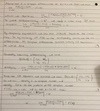Analysis III Flashcards
(95 cards)
Define a Partition

Define Upper Riemann Sums and Lower Riemann Sums

Define the Upper and Lower Riemann Integrals

When is a function Riemann integrable, and what is the integral equal to
Only when U(f) = L(f), and then the integral is equal to this value
Define a refinement

Theorem: Let f:[a,b] to R be a bounded function and P,Q refinements of [a,b] where Q is a refinement of P, then L(f,P) <= L(f,Q) <= U(f,Q) <= U(f,P)

Theorem: Let f:[a,b] to R bea bounded function and P,Q two partitions of [a,b]. Then L(f,P) <= U(f,Q)

Theorem: Let f:[a,b] to R be a bounded function. Then f is integrable if and only if for every ε > 0 there exists a partition P of [a,b] such that U(f,P) - L(f,P) < ε



Define continuity of f

Define uniform continuity of f

Let f:[a,b] to R be a continuous function. Then it’s uniformly continuous

Let f:[a,b] to R be a continuous function. Then it’s Riemann integrable

Theorem: Let f:[a,b] to R be a monotonic function. Then it’s Riemann integrable

Let f,g:[a,b] to R be integrable. Then f + g is integrable

Theorem: Let f,g:[a,b] to R be integrable, and c in R. Then cf is integrable



Let f:[a,b] to R be integrable. Define m = inf f and M = sup f, whats the relationship between m(b-a), M(b-a) and the integral
m(b-a) <= integral <= M(b-a)




Let f:[a.b] to R and c in (a,b). Then f is integrable on [a,b] if and only if it’s integrable on [a,c] and [c,b]

Let f:[a,b] to R be bounded, integrable and Ф: R to R a continuous function. Then Ф o f is integrable

Theorem: Let f,g:[a,b] to R be integrable functions. Then fg is integrable, and if 1/g is bounded then f/g is integrable




































































































